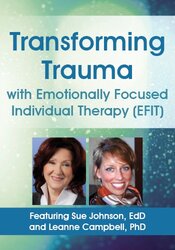

When the overwhelming vulnerability of trauma has warped your client’s sense of self and safety...
...returning to their past experiences – even in a therapeutic environment – can feel unbearable.
The result? Clients who avoid, shut down, or drop out of therapy completely.
But with Emotionally Focused Individual Therapy (EFIT), you can provide the compassionate engagement and security your client needs to get to the heart of their trauma and move from stuck and suffering to healing and growth.
Discover how EFIT uses attachment science and a simple 5-step process to tune in to your client's deepest emotions and help them access lasting healing.
Whether you already have a go-to approach for trauma therapy, or you've been seeking a treatment that fits you as a therapist...
You’ll finish this training with the skills to confidently address your client’s most intense and frightening emotions and finally guide them towards greater emotional balance.
And now you can learn exactly how to apply this innovative modality in your own practice, directly from its developer, Dr Sue Johnson, EdD, and top practitioner Dr Leanne Campbell, PhD.
They’ll share a proven, easy-to-understand roadmap to create change and the knowledge and skills to build a powerful, healing connection through which your clients can reliably recover from trauma.
This online program is worth 6 hours CPD.
| File type | File name | Number of pages | |
|---|---|---|---|
| Presenter slides (2.48 MB) | Available after Purchase | ||
| Handout-Dancing-EFIT-Tango (0.16 MB) | Available after Purchase | ||
| Handout-Tango-SlicingItThinner (0.08 MB) | Available after Purchase | ||
| Handout - EFIT-Summary-article-Therapist.com (0.03 MB) | Available after Purchase |

Dr Sue Johnson is an author, clinical psychologist, researcher, professor, popular presenter and speaker and a leading innovator in the field of couple therapy and adult attachment. Sue is the primary developer of Emotionally Focused Couples and Family Therapy (EFT), which has demonstrated its effectiveness in over 30 years of peer-reviewed clinical research.
Sue Johnson is founding Director of the International Centre for Excellence in Emotionally Focused Therapy (ICEEFT) and Distinguished Research Professor at Alliant University in San Diego, California, and Professor, Clinical Psychiatry at the University of British Columbia, Canada, as well as Professor Emeritus, Clinical Psychology, at the University of Ottawa, Canada.
Dr Johnson is the author of numerous books and articles including Attachment Theory in Practice: EFT with Individuals, Couples and Families (2019) The Practice of Emotionally Focused Couple Therapy: Creating Connection (3rd edition, 2019), and Emotionally Focused Couple Therapy with Trauma Survivors (2002).
Sue trains behavioral health providers in EFT worldwide and consults to over 75 international institutes and affiliated centers who practice EFT. She also consults to Veterans Affairs and the U.S. and Canadian militaries.
Speaker Disclosures:
Financial: Dr Sue Johnson has employment relationships with University of British Columbia, Campbell & Fairweather Psychology Group, Alliant International, University Ottawa, Couple and Family Institute, and the International Center for Excellence in Emotionally Focused Therapy. She receives royalties as a published author. Dr Johnson receives a speaking honorarium, recording royalties, and book royalties from PESI, Inc. She has no relevant financial relationships with ineligible organizations.
Non-financial: Dr Sue Johnson serves on the editorial board for the American Journal of Family Therapy (AJFT) and the journal Couple and Family Psychology: Research & Practice.

Leanne Campbell, PhD, is a Registered Psychologist, author, researcher, co-founder, and managing partner co-founder and managing partner of Campbell & Fairweather Psychology Group, and an ICEEFT (International Center for Excellence in Emotionally Focused Therapy) Certified Trainer.
In addition to providing psychological services to hundreds of individuals, couples, and families over the past three decades, Dr. Campbell provides trainings in Emotionally-Focused Therapy (EFT) to professionals around the globe with a primary focus in the areas of grief and trauma. Most recently, she co-authored with Dr. Sue Johnson the first individually focused EFT book, A Primer for Emotionally Focused Individual Therapy (EFIT): Cultivating Growth and Fitness in Every Client (2021), and was also an author on Becoming an Emotionally Focused Therapist: The Workbook (2nd Edition, 2022).
| 5 |
|
| 4 |
|
| 3 |
|
| 2 |
|
| 1 |
|
Satisfaction Guarantee
Your satisfaction is our goal and our guarantee. Concerns should be addressed to info@pesi.co.uk or call 01235847393.
Please wait ...